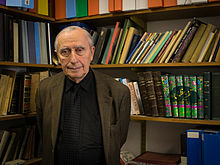Qissat Shakarwati Farmad (alternatively Qissat Shakruti Firmad, literally “Tale of the Great Chera Ruler”) is an Arabic manuscript of anonymous authorship, apparently written in Malabar Coast, south India. It is argued that the qissat is the oldest, most detailed, and comprehensive recorded version of the famous Cheraman Perumal legend (of south India).
The Cheraman Perumal legend traces the introduction of Islam on the Malabar Coast. Almost all of the sources tell the story of
- The Hindu ruler of Kerala, titled the Cheraman Perumal
- Who converted to Islam
- Divided his kingdom among his chiefs
- Sailed for Arabia with the intent of performing the hajj
- Died on his return journey from Arabia to Malabar Coast.
- The dead king’s followers established mosques in Kerala.
The title Shakarwati Farmad is an Arabic version of the medieval Indian royal title “Chakravarti Cheraman Perumal”. The Chera king is also referred within the text as “al-Sultan Shakrawati”. The qissat is currently preserved in British Library (India Office Records, MS. Islamic 2807d, fols. 81a-104a).
Versions of the legend
The later versions of the Cheraman Perumal legend are incorporated by
- Zayn al-Din Makhdum in Tuhfat al-Mujahidin (16th century CE) and in
- Ta’rikh-i Firishta (Persian, 17th century CE).
Varied versions of the legend can also be seen
- A number of medieval Kerala literary sources (such as Keralolpatti) and
- Portuguese chronicles.
- A Telugu version of the legend is also mentioned by some scholars.
As per scholar Y. Friedmann, the version famously narrated by Zayn al-Din Makhdum was directly derived from the qissat. Unlike some of the other versions of the legend, large portions of the qissat takes place after the king’s death on Arabian coast.
First mosques of Malabar according to the qissat
According to the qissat, the first mosque was built by Malik ibn Dinar in Kodungallur, while the rest of the mosques were founded by Malik ibn Habib.

Y. Friedmann conducted pioneering studies on the Qissat in the mid-1970s.
| Location | Qadi |
|---|---|
| Kalankallur (Kodungallur) | Muhammad ibn Malik |
| Kulam (Kollam) | Hasan ibn Malik |
| Hili (Madayi) | ‘Abd al-Rahman ibn Malik |
| Fakanur/Makanur (Barkur) | Ibrahim ibn Malik |
| Manjalur (Mangalore) | Musa ibn Malik |
| Kanjarkut (?Kasaragod) | Malik ibn Muhammad |
| Jurfatan/Jirfatan (Cannanore) | Shahab al-Din ibn ‘Umar ibn Muhammad ibn Malik |
| Darmaftan (Dharmadam) | Hussayn ibn Muhammad ibn Malik al-Madani |
| Fandarinah (Panthalayani) | Sa’d al-Din ibn Malik al-Madani |
| Shaliyat (Chaliyam) | Zayn al-Din ibn Muhammad ibn Malik al-Madani |
